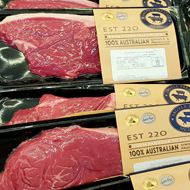Vets respond to Australia trade deal discussions

The government is reportedly preparing to offer Australian producers tariff-free acccess to the UK market.
The BVA has responded to reports that UK ministers are in talks to secure trade deals with Australia and New Zealand, reaffirming that animal welfare standards must not be jeopardised in the pursuit of these or other future agreements.
The organisation has called for any free trade arrangements with Australia and New Zealand 'to have an ambitious and comprehensive animal welfare chapter, including detailed provisions on animal welfare cooperation.'
It comes after reports that the government is preparing to offer Australian producers tariff-free access to the UK market, despite warnings from the NFU (National Farmers Union) that British farmers will struggle to compete with cheap imports under these arrangements.
BVA president James Russell said: “We recognise the importance of securing a firm footing for the UK on the global trading stage now that we have left the EU, but removing barriers needs to go hand in hand with protecting the UK’s hard-won reputation for high welfare standards and preserving the livelihoods of our farming communities.
“Opening the floodgates to cheaper imports in the interests of sealing a deal would spell bad news for animal welfare and undercut our producers, who pride themselves on high standards and offering UK customers the quality that they both deserve and expect.”
In its response to a consultation on UK-Australia trade negotiations last year, BVA noted that animal welfare standards vary significantly between the UK and Australia. While the Animal Protection Index gives the UK a B grade in overall animal welfare, Australia holds a D grade.
Conversely, New Zealand and the UK are broadly similar when it comes to animal welfare legislation. BVA noted that farm animals in New Zealand are protected under the 2006 Animal Welfare Act, and the principle of animal sentience has been recognised in law since 2015.
Mr Russell added that while there are opportunities in terms of future trade agreements, the government must hold firm its commitment that animal welfare will remain at the heart of all discussions.
“We have recognised that a Free Trade Agreement that reduces Sanitary and Phytosanitary (SPS) barriers over time would be a positive step. However, to fully realise these opportunities, the Government needs to give assurances that animal welfare will remain firmly on the table in discussions, and not give concessions that may hamper progress in this critical area.
“Vets play an integral role in ensuring high standards in welfare and food safety from farm to fork, so the profession must be central to discussions as SPS agreements take shape.”



 The Veterinary Medicines Directorate (VMD) is inviting applications from veterinary students to attend a one-week extramural studies (EMS) placement in July 2026.
The Veterinary Medicines Directorate (VMD) is inviting applications from veterinary students to attend a one-week extramural studies (EMS) placement in July 2026.